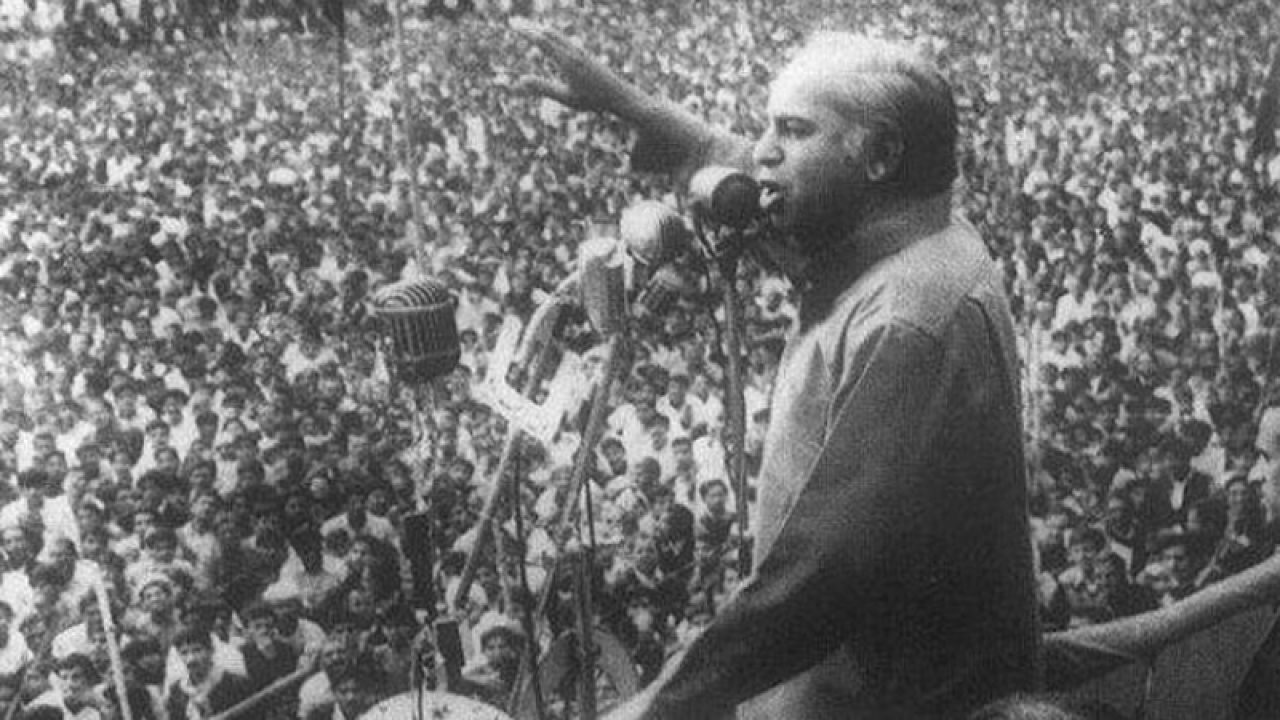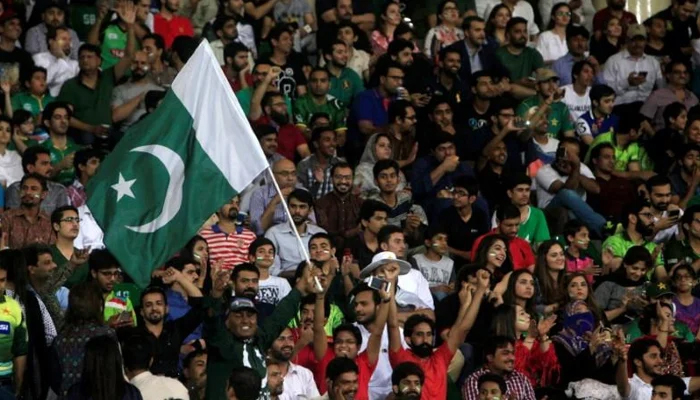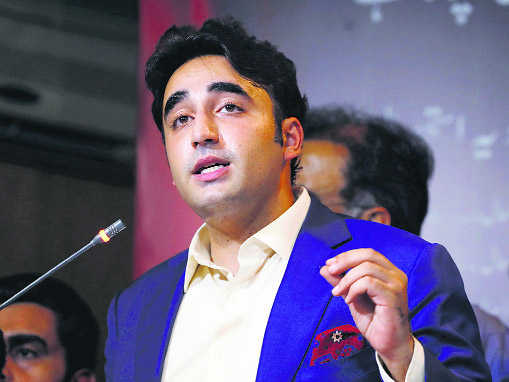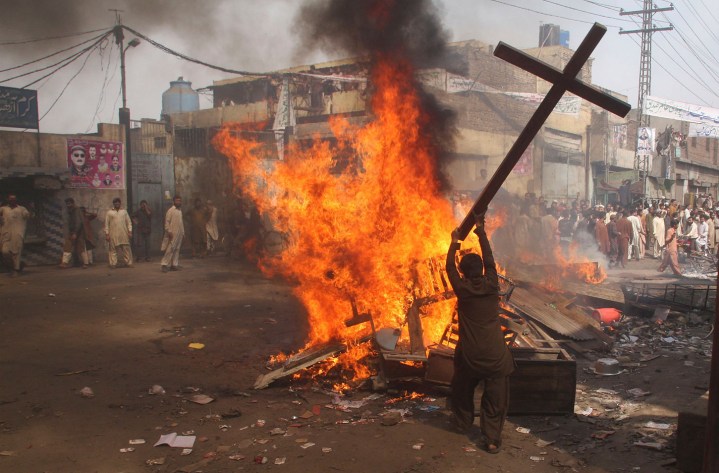 |
wrote a book from his death cell, Titled "If I am assassinated," its last pages contained a quote from Russian author Nikolai Dostoevsky: "Man's dearest possession is his life, and since it is given to him to live but once, he must so live as not to be scared with the shame of a cowardly and trivial past, so as not to be tortured for years without purpose, that dying he can say, 'All my life and my strength were given to the first cause in the world - the liberation of mankind.' " As death stared the Z.A Bhutto in the face, he stared back. His past has no shame of cowardice. His daughter, too, gave her life in courage. "If India builds the bomb we will eat grass or leaves, we will go hungry. But we will get one of our own." This statement by Zulfiar Ali Bhutto should open up our eyes and bring back the passion of patriotism, unity and love for each others for the sake of Pakistan. I would like to express that this man is and was hero of Pakistan.
Bhutto was the only true leader in our history who gave us constitution, identity in international relations. You will be surprised to know when Bhutto became as Foreign Minister, at that time; we did not have ambassador level relations with so many big countries of the world like Indonesia etc. He empowers the poor of his country. Such people like Z.A BHUTTO are born rarely, who will forget his capabilities as an extempore speaker, as an writer, as an diplomat, as an leader and above all as lover of poor. On the day of his martyrdom his opponents called him as a culprit but same are now calling him as an innocent. The simple reason for this is that Zia tried his best to create divisions among people in order to finish the popularity of Bhutto. The irony is all those who hatched conspiracy against him are no more in this mortal world, all of them died a horrible death. Bhutto was the greatest leader we can think in the modern history. In his book "If I Am Assassinated", Bhutto clearly mentions his fear of 120 million Pakistanis under a defenseless sky in comparison to a nuclear India. What a vision! India could have swallowed Pakistan long ago if thanks to Bhutto we were not an atomic power. On the economic front Bhutto vision for nationalization was that Pakistanis will work hard like Chinese, but here Pakistanis failed him. The labor and the management of nationalized industry had no interest to take advantage of this opportunity. Using this as a golden opportunity, the industrialists, bureaucrats, and above all corrupt army declared him as an unsuccessful leader. Bhutto loved poor and poor loved Bhutto. This relationship is ever lasting. The first leader who legislated labor laws and enforced in Pakistan and nobody could do it till now. This is the reason of his popularity among labors. He tried to unite the Islamic world. The Pakistan is still under developing country because Bhutto is not alive. Z.A Bhutto is the first person in Pakistan who has given the voice to the common people. Z.A Bhutto was great charismatic leader, man of masses, top class negotiator, excellent communicator, a visionary, known for mercurial brilliance, wit and a highly well read person. He attracted mammoth crowds where ever he addressed public meetings even in remote regions of the country. He was a man of masses because of his personal charm and charisma and the one who spoke in the language of workers, laborers, peasants and the people in the streets. He would make the people feel that he was one of them, understood them, had solutions to their problems and give them roti, kapra aur makan. He might have given all these things to them if his government had not become target of the establishment's conspiracies. ZA Bhutto's Powerful Political Legacy Cannot be eliminated. In no time Bhutto had made a tremendous impact all around. As Minister for Fuel and Power, he had diverse explorers tapping into Pakistan's underground hidden energy resources. For the first time Russians were involved in oil and gas exploration. His time as Minister for Science and Technology was well spent. He could measure the advancements made by India in the atomic field. I can't help grieving the tragic death of a Hero who paid with his life to set an ultimate example of principled politics. I hope we honor Shaheed Bhutto by giving to the weak and less fortunate people of Pakistan the gift of unconditional empowerment through democracy and moral governance and not trade his dream for our illusions. Bourgeois battled Bhutto's populist economic and political enforcement, the bourgeois and the petty-bourgeois became ready instruments in carrying out their social propaganda against Bhutto. He was the man behind introducing democracy in the country by kicking out the dictatorial rule and finally gave a consensus constitution of 1973 with guarantees to basic human rights under the supremacy of parliament. Cruel dictators like Zia and Musharraf are responsible for bringing fundamentalists into the corridor of power, Mush, who is now trumping against them just an eye wash. Political Leaders must posses' qualities of power, vision, ethics, courage, knowledge, decision making, integrity, enthusiasms and devotion and should have principles, Z.A BHUTTO had all those qualities. Mr. Bhutto lived consciously to make history and to leave a legacy in the form of the development of his nation. He is right credited with saving Pakistan at the darkest moment of its history, as French President Giscardd' Estaing said he was the man,'' who incarnated Pakistan at a dramatic hour of its history''. Z A BHUTTO was indeed a great leader, a leader we must salute today; who gave voice to the voiceless and helped them shape their own destiny. It was under his leadership that every Pakistani given the right to passport. Education was nationalized and made available to every child. Scores of Universities were built to turn the children of the discriminated and downtrodden into lawyers, doctors and engineers liberating them from a destiny of backwardness. Bhutto pushed politics out of the posh drawing rooms into real Pakistan-into the muddy lanes and villages of the poor. The ever-lasting contribution of Bhutto was to raise the consciousness of the people for democracy. He awakened the masses, making them realize they were the legitimate fountainhead of political power. He enlightened the peasants, the industrial workers, the students, the women and the rest of the common people of their importance and of their right of franchise, which is the definite means of bringing changes and improvement in the lives of the common people. He deeply cherished democracy and democratic values and in the end gave his life for the cause of freedom. In the case of Pakistan, he viewed military rule as a negation of the very genesis of the country that came into being as a result of a democratic process and a vote. Today as the Nation pays tribute to one of its greatest sons; it is destined to move forward in the spirit of Federalism, Democracy, Autonomy and Egalitarianism which he lit through his example of courage in the defense of principles and ideals. Z.A BHUTTO was a people leader, a legend and a poet and he remained so till the last breath in his body. He was a true revolutionary; his revolution was against imperialism, against bourgeois. He was a charismatic leader and his charisma still rules the nation. Z.A Bhutto ruled the hearts of people when he was alive and till date he rules their hearts. Z.A Bhutto was a principled friend to the poor, downtrodden and oppressed. He was fearless in his beliefs and refused to bow before any man or power other than the Almighty. His contributions to an impregnable Pakistan are seen in the Kamra Aeronautical factory, Heavy Mechanical Complex at Taxila, modernization of Karachi Shipyard, creation of precision engineering works, Pakistan Steel Mills, Port Qasim, Pakistan Automobile Corporation to name a few. By signing the Simla Accord of 1972 he negotiated longest peace between India and Pakistan. His social reforms laid the foundation of an egalitarian society, his non-aligned foreign policy earned Pakistan respect in the comity of nations. He lifted the nation drowning in a sea of despair to Himalayan heights. The death cell in which his killers kept him failed to break his will or his determination to challenge military rule and stand up as the leader of the people. Bhutto was a modernizer and saw nationalism as the key to unity. He rejected fanaticism. He gave pride to the poor. As leader of the Third World he spoke boldly against racism, colonialism and imperialism. He fearlessly defended the right of nations to independence. When the 1973 Ramadan War broke out, he sent Pakistan's military to defend the borders of the Muslim countries including the Golan Heights of Syria. Bhutto's short life of fifty years was spent in the service of many international, regional and national causes. Today Pakistan is at the crossroads. Its policies relating to Nuclear, Taliban, India, Militancy, Religious Parties, Democracy and Economy are in shambles. Shaheed Bhutto believed that the army could protect its institutional competence by keeping out of politics. He said, "Those soldiers who leave the barracks to move into Government mansions lose wars and become prisoners of war as happened in 1971; his words reverberate as a warning and a guide to the country to save its honor, respect, pride and position by reverting to the golden principles that gave it birth. Z.A Bhutto was born in 1928. He was martyred in 1979. Yet he lives in the hearts and minds of the people still shining like a star that brightens the sky motivating those caught in the prisons of oppression. No doubt, the age of Bhutto was an age of revolution. At the time of his over throw; Bhutto was emerging as a spokesman of the world of Islam and the leader of the third world. Although his life and political career were cruelly terminated, Zulfikar Ali Bhutto will always be remembered as one of the great leaders who took part in the liberation of the third world from the yoke of Imperialism and Neo Colonialism during the twentieth century. "It is better to live like a lion for one day than to live like a jackal for a thousand." Z.A.BHUTTO''. Long Live Bhuttoism!











